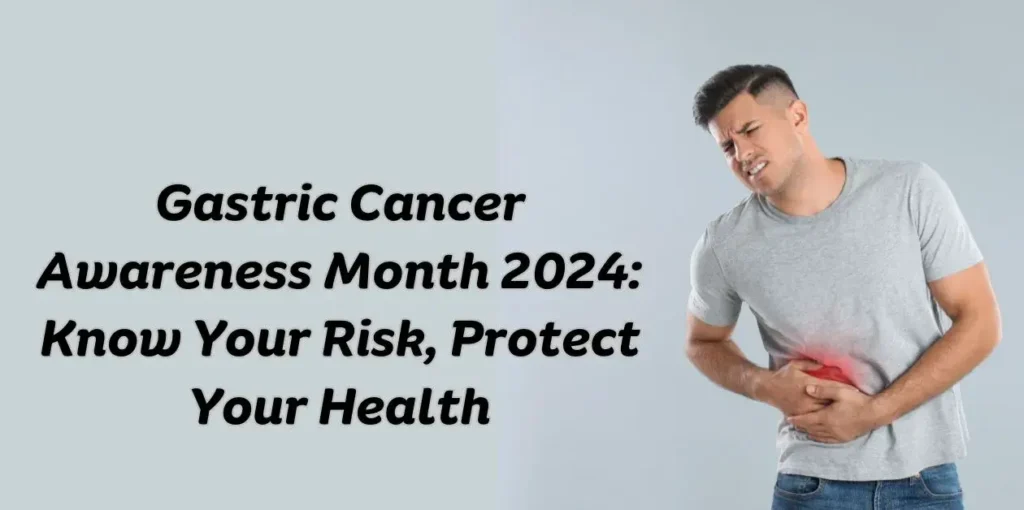Gastric Cancer Awareness Month 2024: Know Your Risk, Protect Your Health

November is Gastric Cancer Awareness Month 2024, a time dedicated to raising awareness about gastric cancer, its symptoms, risk factors, and the importance of early detection. This year’s theme, “debunking common myths surrounding gastric cancer” emphasizes the collective effort needed to combat this disease.
What is Gastric Cancer?
Gastric cancer, also known as stomach cancer, is a type of cancer that forms in the cells of the lining of the stomach. It is a serious health condition that can often go undetected in its early stages. Early detection and timely treatment are crucial for improving patient outcomes.
Common Symptoms and Signs of Gastric Cancer
While early-stage gastric cancer often presents no symptoms, as the disease progresses, individuals may experience the following:
- Persistent indigestion or heartburn
- Loss of appetite
- Unexplained weight loss
- Nausea and vomiting
- Feeling full quickly
- Abdominal pain or discomfort
- Blood in vomit or stool (may appear dark or black)
- Fatigue
- Anemia
Risk Factors for Gastric Cancer
Several factors can increase the risk of developing gastric cancer:
- Age: The risk increases with age, especially after the age of 50.
- Family history: A family history of gastric cancer can increase your risk.
- Helicobacter pylori (H. pylori) infection: This bacterium can cause chronic inflammation in the stomach lining, increasing the risk of cancer.
- Diet: A diet high in smoked, salted, or pickled foods may increase the risk.
- Smoking and alcohol consumption: Both smoking and excessive alcohol consumption are linked to an increased risk of gastric cancer.
- Atrophic gastritis: This condition, characterized by thinning of the stomach lining, can increase the risk.
Early Detection Saves Lives
Early detection of gastric cancer is key to improving treatment outcomes. Regular check-ups and screenings can help identify the disease in its early stages.
Endoscopy: A valuable diagnostic tool for detecting gastric cancer. It involves inserting a flexible tube with a camera into the stomach to examine the lining.
Prevention Strategies
While there’s no guaranteed way to prevent gastric cancer, adopting healthy lifestyle habits can significantly reduce your risk:
- Healthy diet: Consume a balanced diet rich in fruits, vegetables, and whole grains. Limit your intake of processed and red meats.
- Regular exercise: Aim for at least 30 minutes of moderate-intensity exercise most days of the week.
- Avoiding harmful habits: Quit smoking and limit alcohol consumption.
- Vaccination against H. pylori: In some regions, vaccination against H. pylori is available.
Treatment Options at Pi Health Cancer Hospital
At Pi Health Cancer Hospital, we offer a comprehensive range of treatments for gastric cancer. Our experienced team of oncologists and surgeons work together to develop personalized treatment plans for each patient.
Treatment options may include:
- Surgery: Surgical removal of the cancerous portion of the stomach.
- Chemotherapy: Using drugs to kill cancer cells.
- Radiation therapy: Using high-energy rays to kill cancer cells.
- Targeted therapy: Using drugs that target specific molecules involved in cancer growth.
- Immunotherapy: Stimulating the body’s immune system to fight cancer cells.
Supporting Patients and Their Families
At Pi Health Cancer Hospital, we understand the emotional and physical challenges faced by patients and their families. Our dedicated team provides comprehensive support services, including:
- Emotional support: Counseling and support groups to help patients and their families cope with the emotional impact of cancer.
- Nutritional counseling: Personalized dietary advice to optimize nutrition and manage side effects of treatment.
- Rehabilitation services: Physical therapy and other rehabilitation services to help patients regain strength and function.
Join the Fight Against Gastric Cancer
By spreading awareness about gastric cancer, we can encourage early detection and promote preventive measures. You can contribute to the cause by:
- Sharing information: Educate your friends and family about the symptoms, risk factors, and prevention strategies for gastric cancer.
- Donating to cancer research: Support organizations dedicated to funding research for new treatments and cures.
- Participating in awareness campaigns: Join local or national initiatives to raise awareness about gastric cancer.
Advances in Research and Treatment
Significant progress has been made in the research and treatment of gastric cancer. Staying informed about the latest developments can provide hope and options for those affected.
- Latest Research
Recent studies have focused on understanding the genetic mutations involved in gastric cancer and developing targeted therapies to improve patient outcomes. - Treatment Options
Treatment for gastric cancer may include surgery, chemotherapy, radiation therapy, and targeted drug therapy. The choice of treatment depends on the stage and location of the cancer, as well as the patient’s overall health. - Clinical Trials
Participating in clinical trials can provide access to new treatments and contribute to the advancement of gastric cancer research. Patients should discuss with their healthcare providers about the availability and suitability of clinical trials.
Conclusion
Gastric Cancer Awareness Month 2024 is an opportunity to come together and make a difference. By raising awareness, supporting research, and sharing stories and improve the lives of those affected by gastric cancer.

Dr. A. Venugopal
Clinical Director & HOD Medical Oncology Senior Consultant Medical Oncologist & Hemato-Oncologist
About Author
Dr. A. Venugopal
MD (General Medicine), DM (Medical Oncology), MRCP – SCE Medical Oncology (UK), ECMO (Switzerland).
Dr A. Venugopal is One of the best medical oncologist and Hemato Oncologist in hyderabad, currently serving as the Head of the Department and Senior Medical Oncologist, Hemato Oncologist at Pi Health Cancer Hospital in Gachibowli, Hyderabad. He brings over 15 years of extensive experience in the field of Oncology.
